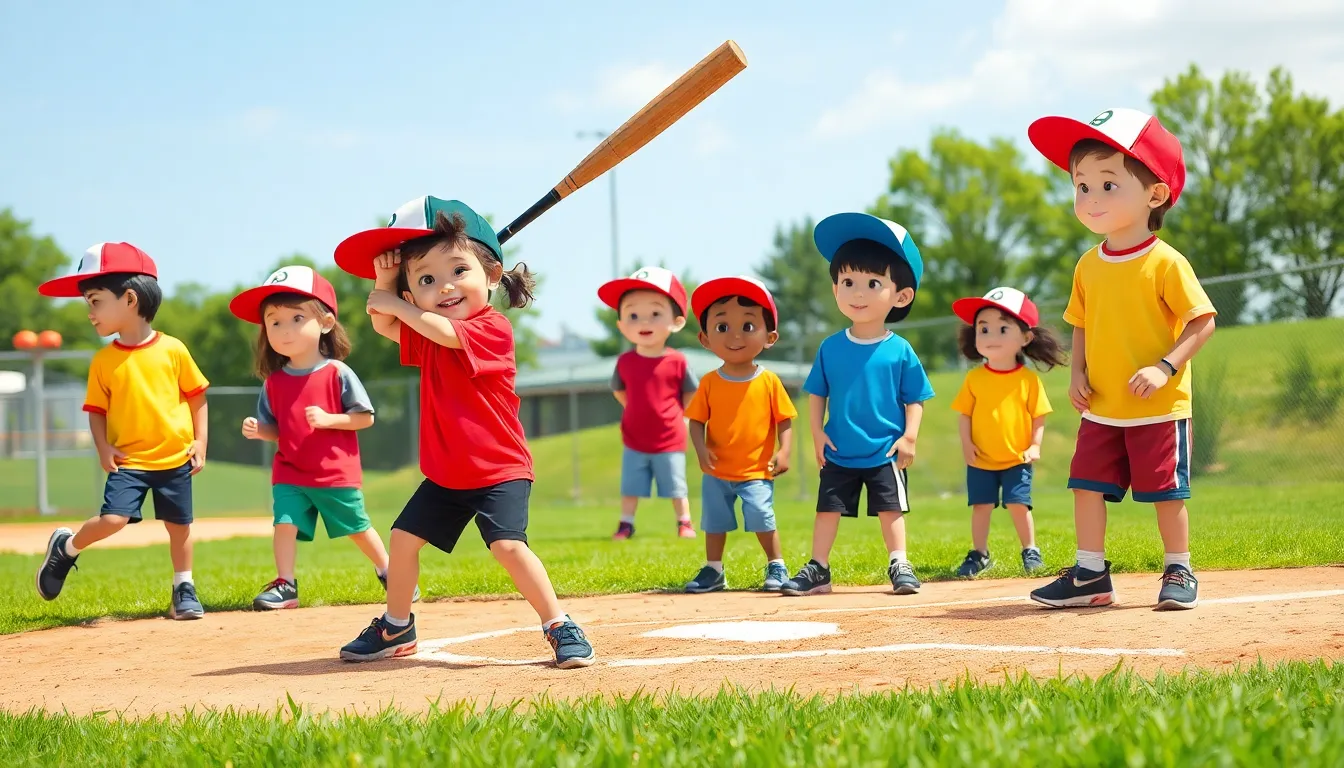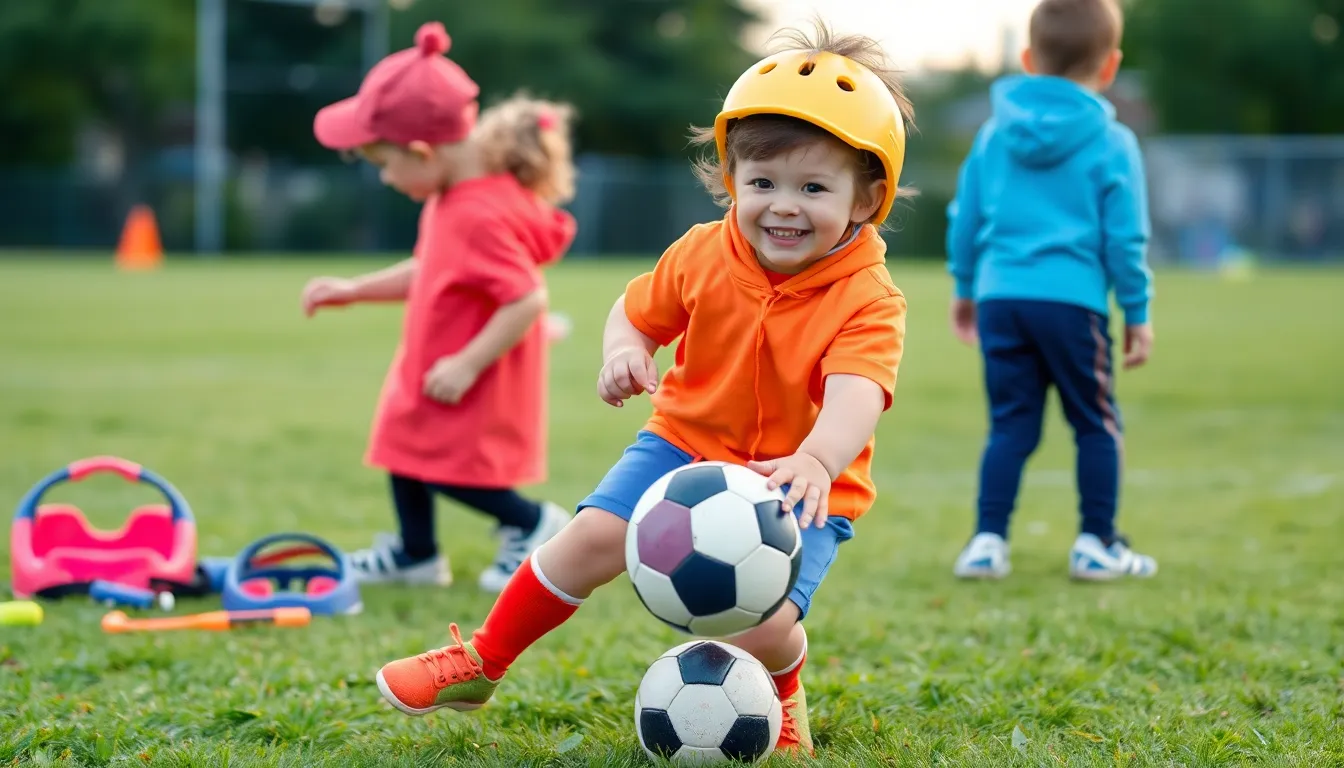When it comes to toddlers, energy levels can rival that of a rocket launch. Parents often find themselves in a whirlwind of activity, trying to channel that boundless enthusiasm into something productive. Enter toddler sports activities—an exciting way to keep little ones active while teaching them valuable skills.
Table of Contents
ToggleBenefits Of Toddler Sports Activities
Toddler sports activities offer numerous benefits that support overall growth. Engaging in these activities promotes physical and social development.
Physical Development
Participation in sports enhances motor skills, coordination, and strength. Activities, such as running and jumping, strengthen muscles and improve balance. Engaging in team sports encourages cardiovascular fitness, contributing to lifelong health. Activities create opportunities for toddlers to practice body awareness and spatial orientation, critical for further physical activities. Parents can observe noticeable improvements in their children’s agility and stamina through regular involvement.
Social Skills Development
Sports activities foster teamwork and communication among toddlers. Interaction with peers during games encourages sharing and cooperation. Learning to navigate victory and defeat builds resilience and sportsmanship. Connecting with others during play helps develop friendships, enhancing emotional intelligence. Engaging in group activities provides structured environments where children learn to express themselves and resolve conflicts constructively. Overall, these experiences contribute to critical social skills necessary for future interactions.
Types Of Toddler Sports Activities

Various classes of toddler sports activities cater to different interests and developmental needs. Engaging in these activities offers diverse benefits to young children.
Team Sports
Team sports provide toddlers an opportunity to learn cooperation. Soccer, t-ball, and mini-basketball rank among the most popular options. These activities foster communication skills and build social connections. They teach young children about teamwork as they work with peers towards a common goal. Participating in these sports also promotes physical fitness, enhancing motor skills like running, jumping, and coordination. Regular involvement can lead to improved self-esteem as toddlers experience group successes.
Individual Sports
Individual sports grant toddlers a sense of independence. Activities like swimming, gymnastics, and martial arts promote personal skill development. These sports encourage children to set and achieve personal goals. Exercising through individual sports aids in enhancing flexibility and overall physical health. Engaging in such activities allows for self-paced learning, boosting confidence as toddlers master new skills. Through individual tournaments or classes, children develop resilience while celebrating personal milestones.
Choosing The Right Toddler Sports Activity
Selecting the appropriate sports activity for a toddler requires careful thought. Parents should assess both age and interest to ensure a positive experience.
Considerations For Age And Interest
Age impacts physical abilities and grasp of sports concepts. Activities like soccer or t-ball suit toddlers aged 3-5 years since they emphasize fun over competition. Interests play a vital role too. Children often show preferences for specific sports based on personal experiences or exposure. Offering various options allows them to explore different activities. Observing a child’s engagement can provide insight into their favorite sports. This approach fosters motivation and encourages skill development.
Safety Tips For Parents
Prioritizing safety is crucial when introducing toddlers to sports. Ensuring equipment is age-appropriate avoids injury risks. Coaches should offer guidance tailored to skill levels while maintaining age-appropriate expectations. Parents must monitor the environment for potential hazards, such as uneven surfaces or overcrowded spaces. Hydration remains essential, especially in warm weather. Encouraging proper warm-up routines can prevent strains and sprains. Regularly checking gear condition ensures it remains functional. Establishing an open dialogue about feelings toward sports can help address any fears.
How To Encourage Participation
Fostering enthusiasm for toddler sports involves creating inviting settings. Parents should encourage active play at home to develop interest. Environments filled with supportive peers nurture positive experiences. Colorful, playful equipment can enhance engagement and motivation. Hosting playdates with friends can introduce friendly competition and collaboration. Providing praise for effort rather than results boosts their confidence.
Creating A Positive Environment
A supportive atmosphere encourages toddlers to try new activities. Coaches and parents can use encouraging language to build self-esteem. Celebrating small achievements helps reinforce their enjoyment of sports. Setting up a routine creates familiarity and comfort around participation. Engaging in team-based games enhances social connections. Regularly discussing fun experiences from sports activities keeps excitement alive. Making participation a family affair adds an element of fun and togetherness.
Setting Realistic Expectations
Setting attainable goals ensures toddlers enjoy their sports experience. Parents should focus on skill development over winning. Younger children benefit from understanding that fun comes first, not competition. Celebrating personal progress, like improved coordination, builds motivation. Parents can monitor their child’s comfort level, adapting activities as needed. Establishing short, manageable sessions keeps toddlers from feeling overwhelmed. Gradually increasing challenges aligns with their developmental stage, fostering growth and confidence.
Toddler sports activities offer a wonderful opportunity for young children to channel their energy into something productive and fun. By engaging in these activities, toddlers not only enhance their physical skills but also develop crucial social abilities that will benefit them throughout their lives. Parents play a vital role in fostering a positive sports experience by choosing age-appropriate activities and creating an encouraging environment.
With the right support and guidance, toddlers can explore their interests while building confidence and resilience. Prioritizing enjoyment over competition ensures that children develop a lifelong love for physical activity. Ultimately, embracing toddler sports can lead to a healthier, happier, and more socially adept generation.




